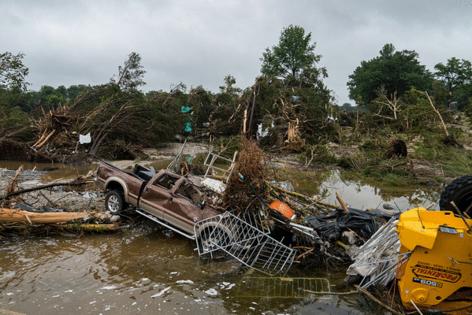Commentary: The deaths in Texas are on the GOP's hands
Published in Op Eds
The horrific flash flood in Texas has left at least 130 dead (including 36 children), and three are still missing. As with most extreme weather events today, it needs to be repeated loudly and clearly: The extreme flooding was made significantly more likely due to climate change caused by greenhouse gas emissions.
After disasters such as these, it’s critically important to provide communities with the resources and assistance they need to recover — and to determine what went wrong so that we can prevent such catastrophes in the future.
There are many institutional failures behind the Texas tragedy. Flood warnings were issued through cell phones and online in a rural county with poor internet service — and at night, when most people are asleep or not on their devices. The county had considered an outdoor siren flood warning system, which could have saved many lives, but decided against it due to the cost.
The state also shares some of the blame for not providing the county with funding. County officials and Texas Gov. Greg Abbott “have urged the public not to point fingers after the flooding,” the AP reports. That’s a self-serving request, since they’re trying to deflect blame from themselves.
The federal government also shoulders a large share of the blame, too.
For starters, the Trump administration has made drastic job cuts at the National Oceanic and Atmospheric Administration (NOAA), the agency tasked with forecasting weather events, assessing risks and issuing warnings. Barely a day before the Texas disaster, the administration proposed more deep cuts to NOAA’s research operations, which are critical in an age of more frequent and severe weather-related disasters.
It’s not certain if the NOAA cuts were a factor in the Texas disaster, with experts offering conflicting assessments. However, continuing cuts at the agency will undermine the federal government’s capacity for monitoring and forecasting weather-related threats at a time when we need more, not less, investment in these capabilities. To put it bluntly, the NOAA cuts are going to kill people.
After the disaster, we need robust recovery efforts. Here again, the federal government is walking away from its responsibility.
Trump previously proposed to eliminate the Federal Emergency Management Agency, the agency that coordinates federal disaster response. In the aftermath of the Texas disaster, the administration is claiming they don’t want to eliminate FEMA, but remake it to put states in charge of disaster recovery.
That’s only marginally better. Unlike the federal government, states can’t run budgetary deficits and are much more fiscally constrained. What’s more, FEMA hasn’t historically been funded anywhere close to the level needed. Shrinking FEMA further will exacerbate an already challenging situation, with state, local and tribal governments finding themselves increasingly strained to cope with the more severe and frequent disasters that are inevitable in the era of climate change.
None of this, of course, addresses the root cause of these disasters: burning fossil fuels.
Regarding this, the Trump administration’s actions have been nothing short of criminal. It’s now official government policy to expand fossil fuel production based on a phony “energy emergency” the administration has declared. The real emergency, of course, is the ever-growing spate of fossil-fueled floods, heat waves and hurricanes.
The federal government views itself as serving greedy fossil fuel oligarchs, whom Trump openly promised favors to in exchange for financial support during his campaign.
The administration doesn’t care if people die and communities are devastated as a direct consequence of the actions of this powerful, politically connected industry. A government that would sacrifice lives to make oil barons richer isn’t a legitimate one.
To protect life on this planet, we need cleaner energy and better public services. And to get those things, we must confront the fossil fuel industry and the politicians who serve it.
____
ABOUT THE WRITER
Basav Sen directs the climate policy program at the Institute for Policy Studies. He wrote this for InsideSources.com.
_____
©2025 Tribune Content Agency, LLC.

























































Comments